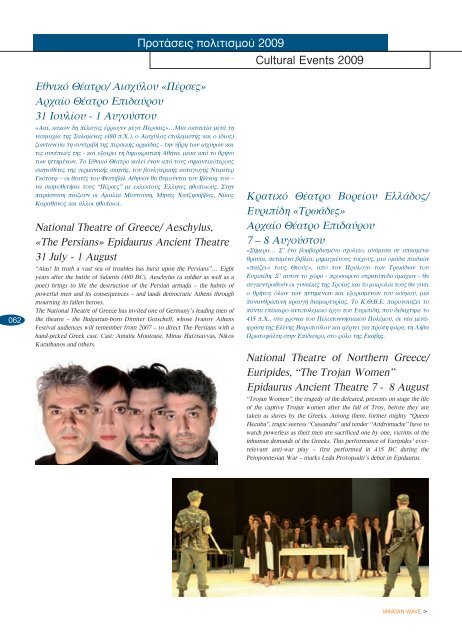Â˘Î¿‰· / Lefkada - Grimaldi Group
Â˘Î¿‰· / Lefkada - Grimaldi Group
Â˘Î¿‰· / Lefkada - Grimaldi Group
You also want an ePaper? Increase the reach of your titles
YUMPU automatically turns print PDFs into web optimized ePapers that Google loves.
ÚÔÙ¿ÛÂȘ ÔÏÈÙÈÛÌÔ‡ 2009<br />
Cultural Events 2009<br />
062<br />
∂ıÓÈÎfi £¤·ÙÚÔ/ ∞ÈÛ¯‡ÏÔ˘ «¤ÚÛ˜»<br />
∞Ú¯·›Ô £¤·ÙÚÔ ∂ȉ·‡ÚÔ˘<br />
31 πÔ˘Ï›Ô˘ - 1 ∞˘ÁÔ‡ÛÙÔ˘<br />
«∞·›, ηÎÒÓ ‰Ë ¤Ï·ÁÔ˜ ¤ÚÚˆÁÂÓ Ì¤Á· ¤Ú۷Ș»…ªÈ· ÔÎÙ·ÂÙ›· ÌÂÙ¿ ÙË<br />
Ó·˘Ì·¯›· Ù˘ ·Ï·Ì›Ó·˜ (480 .Ã.), Ô ∞ÈÛ¯‡ÏÔ˜ (ÔÏÂÌÈÛÙ‹˜ Î·È Ô ›‰ÈÔ˜)<br />
˙ˆÓÙ·Ó‡ÂÈ ÙË Û˘ÓÙÚÈ‚‹ Ù˘ ÂÚÛÈ΋˜ ·ÚÌ¿‰·˜ - ÙËÓ ‡‚ÚË ÙˆÓ ÈÛ¯˘ÚÒÓ Î·È<br />
ÙȘ Û˘Ó¤ÂȤ˜ Ù˘ - Î·È ÂÍ·›ÚÂÈ ÙË ‰ËÌÔÎÚ·ÙÈ΋ ∞ı‹Ó·, ̤۷ ·fi ÙÔ ıÚ‹ÓÔ<br />
ÙˆÓ ËÙÙË̤ӈÓ. ∆Ô ∂ıÓÈÎfi £¤·ÙÚÔ Î·Ï› ¤Ó·Ó ·fi ÙÔ˘˜ ÛËÌ·ÓÙÈÎfiÙÂÚÔ˘˜<br />
ÛÎËÓÔı¤Ù˜ Ù˘ ÁÂÚÌ·ÓÈ΋˜ ÛÎËÓ‹˜, ÙÔÓ ‚Ô˘ÏÁ·ÚÈ΋˜ ηٷÁˆÁ‹˜ ¡ÙÈÌ›ÙÂÚ<br />
°ÎfiÙÛÂÊ – ÔÈ ı·٤˜ ÙÔ˘ ºÂÛÙÈ‚¿Ï ∞ıËÓÒÓ ı· ı˘ÌÔ‡ÓÙ·È ÙÔÓ π‚¿ÓÔÊ ÙÔ˘ –<br />
Ó· ÛÎËÓÔıÂÙ‹ÛÂÈ ÙÔ˘˜ “¤ÚÛ˜” Ì ÂÎÏÂÎÙÔ‡˜ ŒÏÏËÓ˜ ËıÔÔÈÔ‡˜. ÙËÓ<br />
·Ú¿ÛÙ·ÛË ·›˙Ô˘Ó ÔÈ ∞Ì·Ï›· ªÔ˘ÙÔ‡ÛË, ªËÓ¿˜ ÷Ù˙ËÛ¿‚‚·˜, ¡›ÎÔ˜<br />
∫·Ú·ı¿ÓÔ˜ Î·È ¿ÏÏÔÈ ËıÔÔÈÔ›.<br />
National Theatre of Greece/ Aeschylus,<br />
«The Persians» Epidaurus Ancient Theatre<br />
31 July - 1 August<br />
“Alas! In truth a vast sea of troubles has burst upon the Persians”… Eight<br />
years after the battle of Salamis (480 BC), Aeschylus (a soldier as well as a<br />
poet) brings to life the destruction of the Persian armada – the hubris of<br />
powerful men and its consequences – and lauds democratic Athens through<br />
mourning its fallen heroes.<br />
The National Theatre of Greece has invited one of Germany’s leading men of<br />
the theatre – the Bulgarian-born Dimiter Gotscheff, whose Ivanov Athens<br />
Festival audiences will remember from 2007 – to direct The Persians with a<br />
hand-picked Greek cast. Cast: Amalia Moutousi, Minas Hatzisavvas, Nikos<br />
Karathanos and others.<br />
∫Ú·ÙÈÎfi £¤·ÙÚÔ µÔÚ›Ԣ ∂ÏÏ¿‰Ô˜/<br />
∂˘ÚÈ›‰Ë «∆Úˆ¿‰Â˜»<br />
∞Ú¯·›Ô £¤·ÙÚÔ ∂ȉ·‡ÚÔ˘<br />
7 – 8 A˘ÁÔ‡ÛÙÔ˘<br />
«‹ÌÂÚ·… ’ ¤Ó· ‚ÔÌ‚·Ú‰ÈṲ̂ÓÔ Û¯ÔÏ›Ô, ·Ó¿ÌÂÛ· Û ۷Ṳ̂ӷ<br />
ıÚ·Ó›·, Âٷ̤ӷ ‚È‚Ï›·, ÚËÌ·Á̤ÓÔ˘˜ ÙÔ›¯Ô˘˜, ÌÈ· ÔÌ¿‰· ·È‰ÈÒÓ<br />
«·›˙ÂÈ» ÙÔ˘˜ £ÂÔ‡˜», ·fi ÙÔÓ ÚfiÏÔÁÔ ÙˆÓ ∆Úˆ¿‰ˆÓ ÙÔ˘<br />
∂˘ÚÈ›‰Ë. ’ ·˘ÙfiÓ ÙÔ ¯ÒÚÔ - ÚÔÛˆÚÈÓfi ÛÙÚ·ÙfiÂ‰Ô ¿Ì·¯ˆÓ - ı·<br />
Û˘ÁÎÂÓÙÚˆıÔ‡Ó ÔÈ Á˘Ó·›Î˜ Ù˘ ∆ÚÔ›·˜ Î·È ÙÔ ÌÔÈÚÔÏfiÈ ÙÔ˘˜ ı· Á›ÓÂÈ<br />
Ô ıÚ‹ÓÔ˜ fiÏˆÓ ÙˆÓ ËÙÙËÌ¤ÓˆÓ Î·È ÂÍÔÚÈÛÌ¤ÓˆÓ ÙÔ˘ ÎfiÛÌÔ˘, ÌÈ·<br />
·Ó·ÓıÚÒÈÓË ÎÚ·˘Á‹ ‰È·Ì·ÚÙ˘Ú›·˜. ∆Ô ∫.£.µ.∂. ·ÚÔ˘ÛÈ¿˙ÂÈ ÙÔ<br />
¿ÓÙ· ›ηÈÚÔ ·ÓÙÈÔÏÂÌÈÎfi ¤ÚÁÔ ÙÔ˘ ∂˘ÚÈ›‰Ë, Ô˘ ‰È‰¿¯ÙËΠÙÔ<br />
415 .Ã., ÛÙ· ¯ÚfiÓÈ· ÙÔ˘ ÂÏÔÔÓÓËÛÈ·ÎÔ‡ ÔϤÌÔ˘, Û Ӥ· ÌÂÙ¿-<br />
ÊÚ·ÛË Ù˘ ∂ϤÓ˘ µ·ÚÔÔ‡ÏÔ˘ Î·È Ê¤ÚÓÂÈ ÁÈ· ÚÒÙË ÊfiÚ·, ÙË §‹‰·<br />
ÚˆÙÔ„¿ÏÙË ÛÙËÓ ∂›‰·˘ÚÔ, ÛÙÔ ÚfiÏÔ Ù˘ ∂ο‚˘.<br />
National Theatre of Northern Greece/<br />
Euripides, “The Trojan Women”<br />
Epidaurus Ancient Theatre 7 - 8 August<br />
“Trojan Women”, the tragedy of the defeated, presents on stage the life<br />
of the captive Trojan women after the fall of Troy, before they are<br />
taken as slaves by the Greeks. Among them, former mighty “Queen<br />
Hecuba”, tragic seeress “Cassandra” and tender “Andromache” have to<br />
watch powerless as their men are sacrificed one by one, victims of the<br />
inhuman demands of the Greeks. This performance of Euripides’ everrelevant<br />
anti-war play – first performed in 415 BC during the<br />
Peloponnesian War – marks Leda Protopsalti’s debut in Epidaurus.<br />
MINOAN WAVE >
















